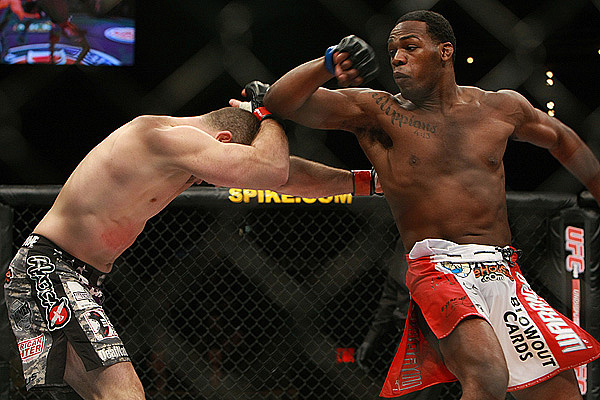Friendly Fire

Two distinctly different schools of thought on fighting teammates: promoters want it. Fighters don’t. And who really holds the power is open to debate.
Jon Jones recently insisted he would never, ever fight Rashad Evans, a peer at 205 pounds that he trains with regularly at Greg Jackson’s camp. This is especially contrary when you consider that Jones stands an excellent chance of being either a No. 1 contender or champion within the next 18 months -- and Evans is on the same podium, with a title shot against Mauricio Rua due sometime in 2011. What happens if Evans is champion when Jones earns his shot?
Doesn’t matter. Fishing is more important. "Fighting Rashad is the last thing I'd ever want to do," Jones told the Las Vegas Review-Journal. "To me, being able to call Rashad when we're 40 years old and say, 'Let's go fishing,' or something like that, that's more important than the paycheck we would get today.”
Jones may not get to do a lot of recreational bass catching if he turns down big fights and antagonizes UFC management. The fight isn’t a pressing issue now, but it will be, guaranteed. Evans and Jones are too good not to end up as competition for one another.
It doesn’t end there: Jon Fitch, the perennial number-two guy at welterweight, says he’d sooner move up to middleweight rather than fight teammate Josh Koscheck. It’s clear that training creates strong emotional bonds, which is no surprise. But in some cases, those bonds threaten to muddy title pictures.
Jones and Fitch are obviously not mercenaries, the kind of guy who would say they’d fight their own mother for money. That takes character. But it also assumes these situations are strictly about cash; they’re not. They’re about finding out whether a fighter owes more to the sport than they do to a personal life.
The UFC wants fighters to consider MMA nothing more than a chess game, where friends would eagerly compete against one another, or a team sport where (literal) brothers can wind up on opposing sides. But MMA, as Dana White is fond of pointing out, is unlike any other sport in the world. It involves having the aggression and motivation to bloody and concuss a human being. If you’re not motivated to inflict that damage, the fight becomes something less than pure. It’s completely stripped of the DNA that makes it competitive.
Jones and Fitch, whether they realize it or not, have it right. MMA is a cyclical sport, and whoever is on top today will probably be struggling to get up from the mat tomorrow. Jones refusing Evans isn’t a lifetime commitment. The minute Evans loses, Jones could come in. The risk is that he passes up a title shot that may never come around again. That’s the price of being a considerate friend.
It’s also possible Jones and Fitch would not be the fighters they are without the benefit of Evans and Koscheck pushing them in the gym. If building a terrific fighter involves scratching a couple of athletes from their potential list of opponents, who really cares?
There may come a day when Evans/Jones is a bitter topic for fans. But I’d sooner watch humans competing than automatons who swing in any direction ordered. Competition without emotion isn’t competition. It’s a video game.






